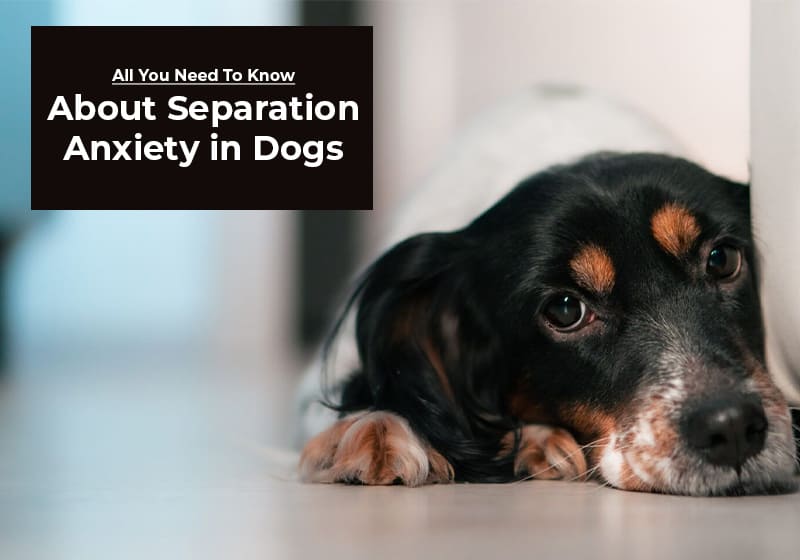Do you find your furry pal trembling and frightened, or the filling of a chewed cushion all around the floor, or scratched and broken furniture when you come back home after a long day? This destructive behavior of your pup can be the result of separation anxiety they may be facing due to you being away from them for a long time. Separation anxiety in dogs is not uncommon but nevertheless needs to be dealt with utmost care and attention.
Let’s take a look at some important aspects of this behavioral disorder that affect the mental and physical health of our canines.

What is separation anxiety in dogs?
As the name suggests, separation anxiety is the fear of your dog being left alone, being separated from you (their human parents), or other animals they are attached to. It is not a common boredom; the symptoms are more severe and are seen especially around the time when you are leaving home.
How to identify separation anxiety in your dog
Dogs act differently when left alone than when they are bored or being naughty or playful. The actions will be more destructive and the behavior more extreme when they are all alone. Here are some of the symptoms your dog will show during separation anxiety:
- Continuous barking or howling
- Circular pacing or quick and repeated walking back and forth
- Uncontrolled panting and excessive drooling
- Refusal to eat meals and treats
- Urinating or defecating inside the house
- Tearing pillows, chewing mats, or scratching heavily on furniture, walls, doors
- Desperate attempts to escape the crate, thereby infusing injuries on self
What leads to separation anxiety in dogs?
Not every dog suffers from separation anxiety when left alone for a brief period, and not all of them display the same behavior when stressed. There can be various reasons for your dog’s separation anxiety. It could be because of:
- Change in location/home
- Departure of a family member
- Change in your schedule
- Change in human parents
How to take care of your dog during separation anxiety?
If your dog shows symptoms of separation anxiety, do not ignore it. It can be painful to see your dog in such a condition. Whether separation anxiety can be prevented is a question of debate, but you can help your dog handle it well with a bit of training.
Here are a few steps that you can take to avoid the stress your dog can develop when you are away:-
- Physical and mental exercise:
A tired or occupied dog is less likely to notice your absence and may not panic when you leave. Brisk walks and exhaustive outdoor plays before you leave them alone will help your pet burn out the energy. They will settle down easily while you are away. Keeping your dog busy with puzzles and toy treats is also a good option to settle them easily. While they are concentrating on solving the puzzle to find and eat the treat, you can safely leave for work.
- Desensitization and counter-conditioning:
Your dog observes your activities closely. They can find the pattern and can start panicking about the actions that you do routinely before going out of the house for long hours. Make conscious efforts to remove this fear from your dog’s mind. by changing the routine. For example, take your car keys and then go back to the kitchen to cook a meal instead of heading towards your car. This way, you can save your pup from stressing out instantly about certain actions.
Making your dog ready to handle separation is necessary to prevent sudden shocks they face on the departure of their favorite person from the house. You can start with leaving them alone for a few minutes and move gradually to longer periods. Reward your furball with their favorite treat when they do not panic and handle the stress well.
- Keep it simple:
Your departures and coming back should not be much of an event. If you act very emotionally before leaving or just after coming back, your dog will start thinking something bad is about to happen, the moment you prepare to step out. They will be restless till the time you are back. To avoid this, keep your leaving and returning back home simple.
- Treatments:
Not all dogs are the same. The emotions they feel are of different intensities. The training and exercise may not be enough for your dog to handle separation anxiety. As a solution, you can try some calming and reliving treatments with natural ingredients to keep your pup stress-free while you are away. Here are a few products that may help your dogs with anxiety and stress:
- Dorwest Scullcap and Valerian Anxiety Tablets for Dogs
- Zylkene Calming Supplement
- Anxitane Chewable Tablets
We recommend consulting with a veterinarian before using any of these treatments on your dog.
Dog Separation Anxiety – Frequently Asked Questions
Do you still have questions in mind regarding separation anxiety in dogs? Take a look at answers to a few of them that can help you identify and handle your pup’s stress in a better way:-
Q. How to differentiate between separation anxiety and other stress?
A. Dogs can face depression and stress due to multiple reasons. However, the destructive behavior due to separation anxiety is more severe and intense. The howling and crying will be constant and louder, the scratching, chewing, and digging will be harder and they’ll panic about particular actions- at the time you leave the house.
Q. Can separation anxiety be cured?
A. There are many reasons for your dog developing separation anxiety. Each dog responds differently even to the stress-handling training process. It is best to keep observing the reactions of your dog to different actions and try to come up with what suits them the best in managing separation anxiety.
Q. Can separation anxiety be prevented?
A. It is not possible to always know how your dog will react when left alone. And so, separation anxiety may not be completely preventable. However, consulting your veterinarian and getting help from an animal behaviorist can help make the process of training your dog to handle separation anxiety better.
Q. Are there any treatment options available for separation anxiety?
A. While it is advisable to manage the separation anxiety in your dog with behavioral training, over-sensitive dogs may require help from treatments in various cases. You can consult your veterinarian and dose your dog with products that can help them calm down when you are away.
In the end
Separation anxiety is a behavioral pattern that your canines show when they are alone and insecure when their favorite human companion is not around or when they are in unfamiliar surroundings. Your furry friends need to be observed closely for the symptoms of separation anxiety. With adequate care, patience, and training, you can help them handle the stress and anxiety in a better way.
